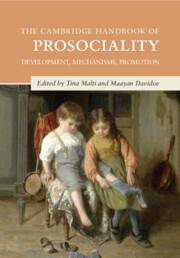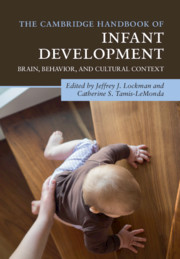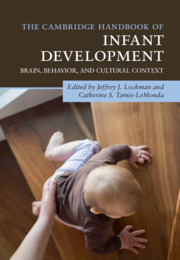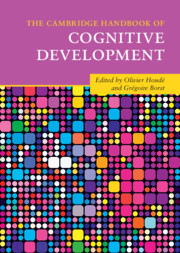The Cambridge Handbook of Prosociality
Prosociality is a multifaceted concept referring to the many ways in which individuals care about and benefit others. Human prosociality is foundational to social harmony, happiness, and peace; it is therefore essential to understand its underpinnings, development, and cultivation. This handbook provides a state-of-the-art, in-depth account of scientific, theoretical, and practical knowledge regarding prosociality and its development. Its thirty chapters, written by international researchers in the field, elucidate key issues, including: the development of prosociality across infancy, childhood, adolescence, and beyond; the biological, cognitive, emotional, and motivational mechanisms that underlie and influence prosociality; how different socialization agents and social contexts can affect children's prosociality; and intervention approaches aimed at cultivating prosociality in children and adolescents. This knowledge can benefit researchers, students, practitioners, and policy makers seeking to nurture socially responsible, caring youth.
- Focuses on developmental processes of change and growth in prosociality across infancy, childhood, and adolescence
- Addresses biological, cognitive, emotional, motivational, and social influences on children's prosociality
- Includes a comprehensive overview of the different socialization agents and how they impact prosocial development
- Summarizes applications to promote prosocial development across contexts, enabling practitioners and policy makers to nurture socially responsible, caring youth
Reviews & endorsements
‘Tina Malti and Maayan Davidov's new Cambridge Handbook of Prosociality: Development, Mechanisms, and Promotion is the state of the art for research and scholarship on prosocial development in childhood through adulthood. This is a very impressive collection of top scholars from a wide range of perspectives on prosociality as it emerges and is applied in a wide array of contexts, from the home to schools and the community. Fascinating questions are posed and grappled with, including the role of genetics, the neurobiology of prosociality, how prosociality changes across the lifespan, how it can be challenged in the context of ingroup bias and outgroup distrust, and its connection to moral values and moral cognition. We learn about the role of siblings, parents, schools, and the media for facilitating or suppressing acts of helping, caring, and sharing towards others. This is an indispensable guide for anyone interested in finding out what makes humans prosocial and how we can foster this orientation for a more just and civil society.' Melanie Killen, University of Maryland, USA and Editor of the Handbook of Moral Development
‘As social animals, humans are born with a healthy dose of empathy and prosociality. It is paramount to know how these tendencies develop in the young and how they can be augmented. For anyone interested in this complex topic, this handbook does an admirable job reviewing current knowledge.' Frans de Waal, author of Mama's Last Hug: Animal Emotions and What They Tell Us about Ourselves
Product details
May 2023Adobe eBook Reader
9781108890816
0 pages
This ISBN is for an eBook version which is distributed on our behalf by a third party.
Table of Contents
- Part I. Development of Prosociality:
- 1. Introduction: what is prosocial development? Definition, history, mechanisms Tina Malti and Maayan Davidov
- 2. Developmental theories of prosociality Nancy Eisenberg and Tracy L. Spinrad
- 3. The role of genetics in the development of prosocial behavior Ariel Knafo-Noam and Dana Katsoty
- 4. Neurobiology of prosociality: investigating the link between empathy and prosocial behavior in the brain Claus Lamm and Paul A. G. Forbes
- 5. The developmental psychophysiology of prosociality Paul D. Hastings, Ryan T. Hodge and Lindsey C. Partington
- 6. Early prosociality from a developmental and comparative perspective Felix Warneken and Sarah Probst
- 7. Prosocial behavior in infancy and early childhood Dale F. Hay
- 8. Prosociality in middle childhood Richard A. Fabes and Stacy L. Morris
- 9. Prosocial behaviors in adolescence Gustavo Carlo, Fiorella L. Carlos Chavez and Clara López-Mora
- 10. Prosocial development across the lifespan Antonio Zuffiano, Emanuele Basili, Stefania Sette, Maria Gerbino, Concetta Pastorelli and Bernadette Paula Luengo Kanacri
- Part II. Antecedents and Mechanisms of Prosociality:
- 11. The motives of prosocial behavior Joscha Kärtner
- 12. Morality, values, and prosociality across development: intertwined yet distinct Audun Dahl and Marie Grace S. Martinez
- 13. Emotions and prosociality Ross A. Thompson
- 14. Social-cognitive development and early prosocial behavior Markus Paulus
- 15. Temperament and prosocial behavior Deborah J. Laible, Afra E. Agalar, Clare Van Norden and Alysia Cruz
- 16. Gender and prosocial development Jolien Van der Graaff
- 17. Assessing prosociality: an early ontogeny perspective Robert Hepach
- Part III. Development of Prosociality in Context:
- 18. Parenting and children's prosociality: multiple pathways to socialization Maayan Davidov and Joan E. Grusec
- 19. Sibling influences upon prosociality: from infancy to adolescence Claire Hughes and Alison Pike
- 20. Prosocial behavior, peer relationships, and friendships Kristina L. McDonald, Melanie A. Dirks, Kristen A. Dunfield and Estephen A. Hakim
- 21. Explaining in-group bias and out-group bias in children's prosocial behavior: the role of group stereotypes Jellie Sierksma
- 22. Prosocial behavior in school contexts Stuart I. Hammond, Robert P. Hill and Victoria L. L. Edwards
- 23. Community and neighborhood influences on prosociality in children and youth Benjamin Edwards and Jacqueline Allen
- 24. Culture and prosociality Tara Callaghan and John Corbit
- 25. Prosocial media Laura M. Padilla-Walker, Hailey G. Holmgren, and Ryan D. McLean
- Part IV. Applications: Nurturing Prosociality:
- 26. Fostering prosociality in the family context: a review of parent-and family-focused interventions promoting children's effortful control Qing Zhou, Aya Williams and Kaley Curtis
- 27. Prosociality and civic engagement Laura Wray-Lake
- 28. Prosocial behavior, positive youth development and character virtues: a dynamic, relational developmental systems-based model Richard M. Lerner, Jacqueline V. Lerner and Mary H. Buckingham
- 29. Relational practices of care to nurture prosociality and advance policy Tina Malti and Ruth Speidel
- 30. Toward a new era of prosociality research: priorities, challenges, and possibilities Maayan Davidov and Tina Malti.






